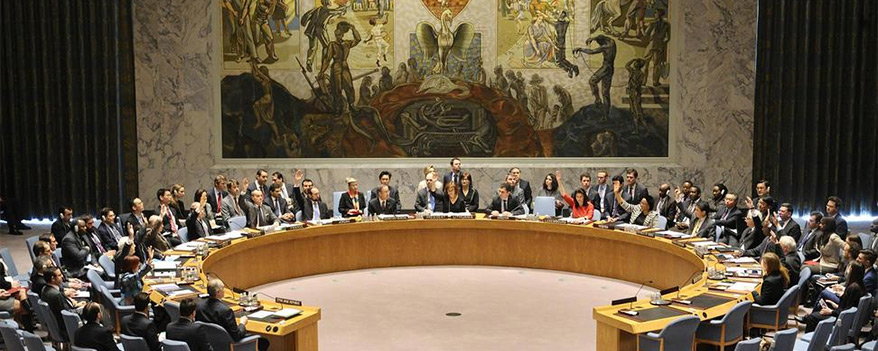With anti-nuclear countries joining the Security Council for the next two years, does the proposal for the UN to ban nuclear targeting of populated areas have a chance of success?
At the 3rd International Conference on the Humanitarian Impact of Nuclear Weapons, held in Vienna in December last year, Jonathan Granoff from UNFOLD ZERO proposed that the United Nations General Assembly and the United Nations Security Council adopt resolutions affirming that the nuclear targeting of populated areas would be a violation of international law (See Jonathan Granoff presentation to the plenary).
“Other uses of nuclear weapons also violate international law,” said Mr Granoff “but there should be no question that it is illegal to destroy a city, or to threaten to destroy a city. Until we can obtain a global convention to eliminate nuclear weapons, this step would make us all safer. It would downgrade the political status of, and military plans to use, these horrible devices.”
The proposal follows up an initiative of Mayors for Peace. “There are over 6,000 cities already members of our campaign called Cities Are Not Targets! declaring it illegal to target cities with nuclear weapons,” said Aaron Tovish, campaign director for Mayors for Peace and one of the coordinators of UNFOLD ZERO. “This initiative to have the bodies of the United Nations explicitly outlaw such conduct is of great value.”
Nuclear weapon States do not make their nuclear targeting plans public. However, nuclear deterrence policy is based on the threat of massive retaliation which does not rule out the use of nuclear weapons against targets within or close to cities and other populated areas.
Inter Press Service interviewed U.S. Air Force Major General Charles Dunlap Jr., former Deputy Judge Advocate General on this issue. (The Judge Advocate General’s office is responsible for determining the legality of all US military operations). Dunlap argued that there is no authoritative prohibition on the use of nuclear weapons in IHL. “It sounds as if Mr. Granoff assumes that IHL applicable to the use of conventional weapons would automatically apply to the use of nuclear weapons. This is incorrect.”
Alyn Ware of UNFOLD ZERO disputes the claim that IHL does not apply to nuclear weapons. “The International Court of Justice affirmed in 1996 that the laws of warfare, and in particular international humanitarian law, apply to nuclear weapons. The Nuclear Weapon States accepted this, and reaffirmed in the final document of the Non-Proliferation Treaty Review Conference of 2010 ‘the need for all States at all times to comply with applicable international law, including international humanitarian law.’ ”
“IHL renders any use of nuclear weapons illegal. A nuclear weapon has a much larger blast impact than conventional weapons. The blast impact can’t be contained to a specific military target,” says Ware. “If a nuclear detonation is far away from populated areas, some might argue that such use could be consistent with IHL, even though there would still be widespread and long-term impact from radioactive fallout… but you can’t even make this argument when a nuclear weapon is targeted on a military asset in or near a populated area.”
The proposal to move the UN General Assembly (UNGA) to adopt such a resolution might not be that difficult. Already the UNGA has adopted resolutions affirming that any use of nuclear weapons would constitute a crime against humanity, the most recent of which was adopted in December 2014. However, these resolutions are not supported by all the nuclear-armed States, and in any case are only declaratory.
A Security Council resolution would be binding, but would be more difficult to achieve. The Security Council requires agreement by China, France, Russia, UK and US to adopt any resolutions. China and the US might agree to such a resolution – China supports the UNGA resolution previously mentioned and the United States has affirmed the practice of the non-use of nuclear weapons (see From nuclear taboo to a prohibition (ban) on use: The next step to a nuclear-weapon-free world). The US and China also participated in the 3rd International Conference on the Humanitarian Impact of Nuclear Weapons. Convincing the others to agree appears unlikely at this stage.
However, the proposal could be raised in a thematic session of the UN Security Council by one of the non-nuclear members of the UN Security Council. Indeed, the SC currently has a number of member countries that have taken leadership on nuclear abolition, any of which could initiate such a session – Chile, Jordan, Malaysia, New Zealand, Nigeria and Venezuela. If such a session was held, it would throw a spot-light on the current nuclear targeting policies of the nuclear armed States, and generate global public opinion to end the macabre plans to annihilate cities with these tools of destruction.Air Jordan 1 Mid “What The Multi-Color” For Sale

